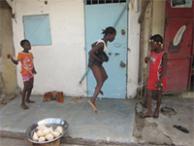Notes from the Field: In the Weeds in Cote d’Ivoire
 Although we are officially ‘in the field’ it isn’t really very ‘fieldy.’ So far I am far removed from the work on the ground, the messy and difficult work that is being done by countless committed individuals who are deep ‘in the weeds.’ Unlike them, I am staying in air-conditioned hotels and central offices, in a nice resort, and in comfortable conference rooms. The focus of that work is on conversation. Conversations around the futures we want to create, conversations about what is important or what is missing. Conversations between people who didn’t know each other and who have each a perspective to offer that makes our work more complete, more realistic, more responsive and more doable.
Although we are officially ‘in the field’ it isn’t really very ‘fieldy.’ So far I am far removed from the work on the ground, the messy and difficult work that is being done by countless committed individuals who are deep ‘in the weeds.’ Unlike them, I am staying in air-conditioned hotels and central offices, in a nice resort, and in comfortable conference rooms. The focus of that work is on conversation. Conversations around the futures we want to create, conversations about what is important or what is missing. Conversations between people who didn’t know each other and who have each a perspective to offer that makes our work more complete, more realistic, more responsive and more doable.
Conversations are at the heart of behavior change communication, and at the heart of those of us involved in strengthening capacity as part of the Health Communication Capacity Collaborative (HC3). Our trip to Cote d’Ivoire takes place in this context: conversations about useful tools for those who work in the trenches.
But today we get into a car and drive to a popular neighborhood of Abidjan. We turn off the main road into an unpaved alley and stop in front of a low concrete structure. Four large steps up land us in the headquarters of a tiny NGO that is holding its own in the fight against HIV and AIDS, here deep in the trenches and deep in the weeds.

The place is crowded, inside and outside. There is much unemployment, substance abuse, violent behavior, and sex for money in this quarter. Much of that is fueled by the frustration that comes from marginalization, deep poverty and few prospects for a better life.
We are met by three volunteers and given a tour of the premises. This doesn’t take long, five steps in each direction is enough to survey the entire place. There are about five small rooms, the size of big closets really. Each is loaded with stuff, boxes, furniture, equipment and files piled on top of each other. Two ancient computers flicker with spreadsheets, in a green haze; reports to donors in all likelihood, a scanner that has seen better times, an old dusty printer and lots of ‘dossiers.’ It is all very minimalist and, for us spoiled westerners, not what we would consider a conducive work environment. The volunteers who receive us, nevertheless, are proud of their premises and the work they are able to do from that base; hats off to them.
The founder, and anyone else who is not engaged in an activity, are watching a ‘policier’ that has all the ingredients for success: sex, violence, fast cars, strong bad men and cops – probably the same ingredients that make for all the poverty around them, minus the cars and the cops – no sign of them in the neighborhood.
Someone brings us bottled water and a box of tissues, to wipe the sweat form our brows. And then we start to talk, or rather, they talk and we listen. Hearing their stories, the work they do, the attitudes they change is humbling. They are among the many service agencies that implement Super Go, with Go standing for ‘gardien-onge’ or guardian angel, and Africa Transformation, both programs aimed at changing attitudes and behaviors for girls (Super Go) and both sexes (Africa Transformation). One of our guides benefitted herself from the program and is now paying it forward. Her eyes light up when she talks about how her life has changed. She is now studying to become a lawyer – something unimaginable earlier in her life. We are often asked about impact – and here she is, impact talking directly with us!
The stories are moving; people do so much with so little. If there is little of the things we generally expect and need in order to do a good job, they do have one thing aplenty: commitment. It drives everything, confirming once more that human energy for something is our most precious resource. In fact, when I ask them about their personal vision, it is the same as their vision for their NGO.





Leave a Reply
Want to join the discussion?Feel free to contribute!